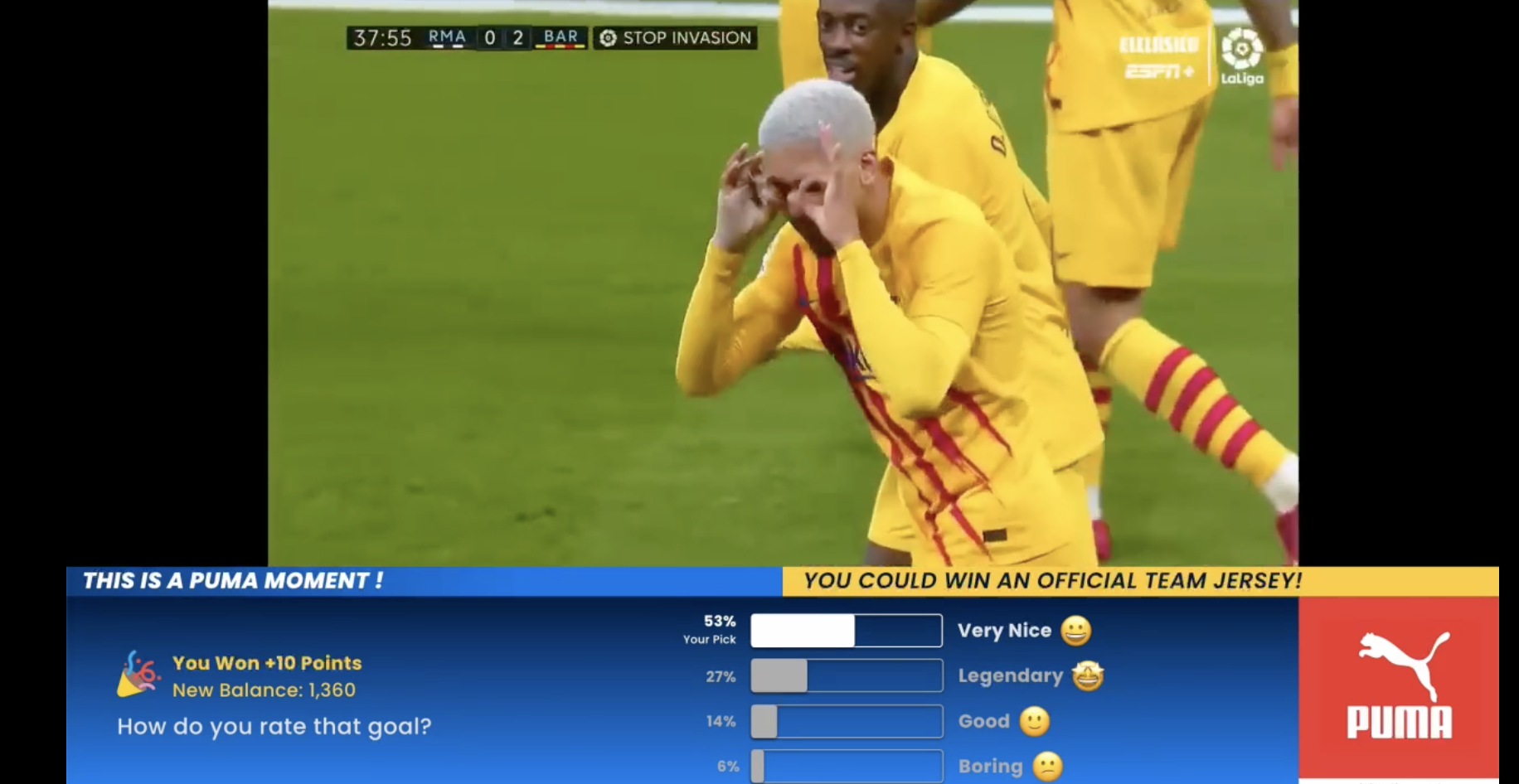Is Play Anywhere’s Interactive TV Platform a Game Changer? La Liga Thinks So
Play Anywhere CEO Yaacov Ben-Yaacov discusses new approach to driving iTV revenues, services
Story Highlights
Interactive TV, whether letting fans direct their own games or allowing ecommerce, betting, or personalized content feeds, has often been seen as a promised land of not only increased ratings but also increased revenues. One key stumbling block has been what exactly are interactive-TV rights, who controls them, and who can monetize them? Play Anywhere, creator of an AI engine and fintech platform offering an iTV-compliance engine, clearinghouse, and analytics platform, aims to change that.

Play Anywhere’s deal with La Liga will make it easier for rightsholders and the league to offer interactive-TV features like voting and ecommerce.
The most recent examples of how Play Anywhere may move the needle on globally distributed interactive-TV experiences are deals with Dentsu and La Liga that point to a more harmonized future. The La Liga deal highlights a new approach to interactive services: all the stakeholders in the content-distribution value chain benefit from new revenue generated through sponsorships, advertising, ecommerce and, where permitted, gaming advertising and affiliate fees, and transparency is provided to commercial participants through real-time dashboards.
“It is a global exclusive deal across all mediums,” says Play Anywhere CEO Yaacov Ben-Yaacov. “That means, if anyone wants to do interactivity, they must put the Play Anywhere compliance and accounting platform in. You can now have these rights at no extra cost, and here’s the way you can implement them. It’s about creating an ecosystem.”
Play Anywhere, he says, likes to think of itself as a fintech platform of compliance and accounting. Compliance means not only financial but also the type of interactive offering, when it is offered during the event, and to whom it is offered. As long as media-rights holders connect to the Play Anywhere platform, they will be granted rights to offer an enhanced viewer interactive experience without a license fee or setup fees.
“We defined a new rights package called Interactive Rights,” Ben-Yaacov explains. “It basically includes live, VOD, or highlight clips coupled with contextual or interactive ads that allow betting or purchasing or have QR codes. We allow the rightsholders to have those rights, but we define the compliance layer, who gets the money, and so forth.”
Because interactivity has so many possible offerings — from sponsorship of a moment within a sports event to ecommerce, free-to-play advertising, and gaming — it is important to create a single clearinghouse for all those elements, Ben-Yaacov says: the company can do the entire tech stack, including the frontend to consumers. But the real goal is to make it easier for leagues and rightsholders to not only create compelling interactive experiences but also find new revenues without having to upend their sales and media teams.
“We need to let the ecosystem keep operating as it is,” he says, “meaning that rightsholders are rightsholders and they have a media-sales team that sells advertising. We also need to help solve some of the issues around overlapping rights [like digital signage], and we also don’t want to be a cost center.”
Thus, the clearinghouse. Not only does it provide inventory that broadcasters and leagues can sell, but, according to Play Anywhere Chief Strategy Officer Pete Scott, Play Anywhere can also backfill the service. And, instead of charging an upfront fee for an interactive service, Play Anywhere’s clearinghouse allows 80% of all revenues to be paid back to four stakeholders: the league, tournament, or media owner; broadcasters and rightsholders; distributors, such as an MVPD or OTT platform; and strategic partners providing enabling technologies.
“We bring all the money into the clearinghouse,” he says, “although we do let gaming revenue stay separate as we want the ecosystem to operate as it has previously.”
As an example, Ben-Yaacov notes mobile-services push-notification-provider Pushologies, whose technology allows video highlights to be sent out via push messaging. “When the highlight is sponsored, that revenue goes into the interactive rights.”
The clearinghouse also allows sponsor elements and opportunities to be sold all the way down to the athlete level, such as when a player scores a goal or does something else of note.
As for gambling, an interactive experience gaining increased attention in the industry. Ben-Yaacov notes that Play Anywhere can provide integration with a sportsbook but does not facilitate the bet.
“We do think some experiences are better on a second screen,” he says. “We will keep them on the second screen, like integrating with a sportsbook. We don’t touch that money, but we can facilitate the bet. And then the sportsbook will pay us one of three types of fees: customer-acquisition, customer-retention, or advertising or sponsorship.”
The same approach to fees also goes for ecommerce, like jerseys via Fanatics, or ticket giveaways and free-to-play gamification, like trivia or predict-the-play.
“It’s about giving added value; it’s not about spamming viewers with ads,” he says. “The key focus is added value for the consumer.”
Key to the whole effort, says Ben-Yaacov, is an understanding by the leagues that interactive rights have to be treated with the same respect as the actual media rights.
“In the same way that they had to put DRM onto streaming, they have to put compliance and accounting onto interactivity,” he says. “The good news with Play Anywhere is, they’re not going to be charged up front like they are on a DRM platform. And, since the league is in the same interactive bucket as the rightsholder, the rightsholder gets a cut of revenues.”
Play Anywhere’s compliance platform also encourages rightsholders to bring best-of-breed services to the table.
“If a rightsholder wants to build their own frontend interface,” adds Ben-Yaacov, “they can build it as long as it is connected to the compliance and accounting layer. Also, if they are the distributor as well as the rightsholder, they can get a bigger piece of the pie. That is one of the secrets behind the clearinghouse.”
